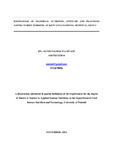| dc.description.abstract | Introduction: Maternal nutrition is essential from conception and throughout pregnancy as it is a critical factor in child survival, growth and development. Nurses are well placed to provide nutrition education during pregnancy by nature of their roles in healthcare. The main objective of this study was to establish the knowledge of maternal nutrition, attitude, and practices and their relationships among nurses working at the Reproductive Health Department, Kenyatta National Hospital.
Research Methods: This was a cross-sectional analytical study involving 171 nurses working at the Reproductive Health department, Kenyatta National Hospital in Kenya. Ethical approval was obtained and a 53-item validated semi-structured questionnaire was used to collect data. Key informant interviews and direct observations were used to collect qualitative data. Data was analyzed using Statistical Package for Social Sciences (SPSS) version 22. Socio-demographic and nutrition training background data was analyzed using descriptive statistics. Pearson’s Chi-square test, Kruskall-Wallis test and odds ratio were used to test for associations. Independent t-tests, analysis of variance, and Mann Whitney U test were used to test group means. Multiple linear regression analysis was used to determine the relationships between the continuous dependent variable and independent variables.
Results: Majority of the nurses (77.8%) were females with a mean age of 39.5±10 years. More than two thirds (71.3%) were diploma holders and majority (88.9%) had covered a topic on maternal nutrition while (77.2%) had attended a short professional course including maternal nutrition. The mean maternal nutrition knowledge score of the nurses was 9.46±2.26 out of 15 while the mean attitude score was 34.66±4.72 out of 40. There was a significant association between knowledge and attitude of the respondents. Respondents who had adequate knowledge on maternal nutrition were more than five times more likely to have a positive attitude towards maternal nutrition care as compared to those with inadequate maternal nutrition knowledge (OR=5.42, CI[3.94-7.45], p=0.007). Further analysis showed that attitude (p<0.001) and length of short professional trainings (p<0.002) were significant predictors of maternal nutrition knowledge.
Conclusion: The study has shown that the knowledge of the nurses on maternal nutrition is above average. They have a positive attitude towards maternal nutrition care but their practices seem to contradict their knowledge and attitude revealing a missing link. The study findings provide a need for fostering teamwork, providing job aids, and incorporating on-job-training approaches and supportive supervision in maternal nutrition care so as to holistically enhance knowledge, attitude and practice skills development among nurses which in turn will improve quality of maternal nutrition care at Kenyatta National Hospital. | en_US |



